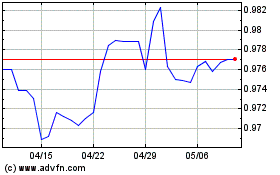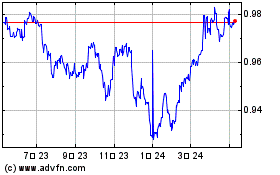Euro Advances As Eurozone Private Sector Activity Hits Near 12-Year High
The euro strengthened against its key counterparts in the
European session on Monday, as the euro area economy expanded at
the fastest pace pace since mid-2006 in January.
Final data from IHS Markit showed that the composite output
index rose more than initially estimated to 58.8 in January from
58.1 in December. The flash score was 58.6.
The headline index has signaled expansion for 55 successive
months and the latest score was the highest since June 2006.
German final composite PMI came in at 59.0 versus 58.9 in
December and the flash 58.8. Likewise, the services PMI improved
more than estimated to 57.3 from 55.8 a month ago.
That said, German political tensions kept the currency's gain in
check. Investors became nervous after coalition negotiations
between German Chancellor Angela Merkel's conservative party and
the Social Democrats broke down over the weekend.
The euro traded mixed against its major opponents in the Asian
session. While it rose against the greenback and the pound, it held
steady against the franc and the yen.
The euro reversed from an early low of 1.2424 against the
greenback, rising to 1.2475. The euro is poised to find resistance
around the 1.26 level.
The single currency advanced to 0.8837 against the pound, its
strongest since January 19. This may be compared to a low of 0.8812
hit at 5:00 pm ET. On the upside, 0.90 is possibly seen as the next
resistance level for the euro.
Survey data from IHS Markit showed that the U.K. services PMI
dropped more-than-expected to 53.0 in January from 54.2 in
December. It was forecast to fall to 54.0.
The 19-nation currency bounced off to 1.1597 against the Swiss
franc, from a 4-day low of 1.1573 hit at 3:30 am ET. Continuation
of the euro's uptrend may see it challenging resistance around the
1.17 area.
Having fallen to a 4-day low of 136.62 against the Japanese yen
at 3:00 am ET, the euro reclaimed some of its lost ground and was
trading at 136.94. The next possible resistance for the euro is
seen around the 139.00 level.
Survey by IHS Markit showed that Japan's service sector activity
expanded at a slightly faster pace in January.
The seasonally adjusted services purchasing managers' index, or
PMI, rose to 51.9 in January from 51.1 in December.
The euro rose back to 1.7054 against the kiwi and 1.5706 against
the aussie, from its early lows of 1.7001 and 1.5669, respectively.
The currency has set a 1-1/-2 month high of 1.7102 against the kiwi
and more than a 2-month high of 1.5758 versus the aussie in early
Asian deals. If the euro rises further, it may target resistance
around 1.72 against the kiwi and 1.60 against the aussie.
The common currency advanced to 1.5484 versus the loonie, off
its previous low of 1.5451. The euro is seen finding resistance
around the 1.56 level.
Looking ahead, U.S. ISM non-manufacturing composite index for
January is set for release in the New York session.
At 11:00 am ET, the European Central Bank President Mario Draghi
will testify on the ECB's Annual Report for 2016 before the
European Parliament in Strasbourg.
Euro vs CHF (FX:EURCHF)
FXチャート
から 3 2024 まで 4 2024

Euro vs CHF (FX:EURCHF)
FXチャート
から 4 2023 まで 4 2024
